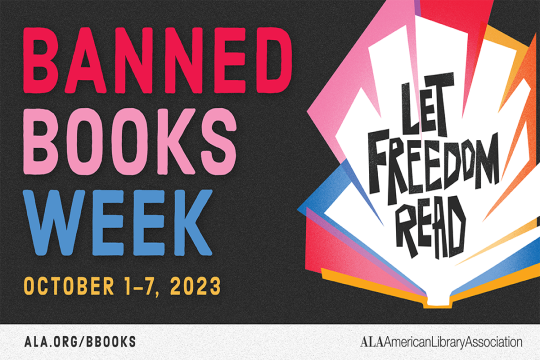New York, NY - “Something will be offensive to someone in every book, so you’ve got to fight it.” – Judy Blume
In recognition of the American Library Association’s Banned Books Week (October 1-7, 2023) and the Canadian Book and Periodical Council’s Freedom to Read Week, Women of Reform Judaism President Sara Charney and Executive Director Rabbi Liz P.G. Hirsch (she/her) issued the following statement:
WRJ has become increasingly concerned by the widespread challenge, access restriction and banning of diverse books in the United States. As strong supporters of education, literacy, and our youth, WRJ knows these attempted and implemented book bans do nothing except stifle creative freedoms. Now more than ever, WRJ reaffirms our strong opposition to the banning of books and our commitment to ensuring freedom of speech through literature in the United States, Canada and around the world.
Over the past year, we have seen an alarming rise in the removal of books from libraries particularly in the United States. The American Library Association (ALA) reported that in 2022 they saw 1,269 demands to censor library books and resources, the highest number since they have been recording data on the issue. In the first nine months of 2023, ALA documented 1,915 unique challenges to books – a 20% increase from the same reporting period in 2022. Books are challenged and banned for several reasons, sometimes even with the best of intentions, but one thing is clear: the removal of books from schools or libraries, even temporarily, is an attack on free speech, education, creativity, and history itself.
In honor of International Literacy Year in 1989, WRJ spoke out in support of global literacy, and our dedication to “education as a fundamental human right.” In our 1993 resolution on Citizenship and Civic Responsibility, WRJ affirmed its support for civic engagement in the issues at every level of government, specifically referencing the fight against those who use “religious values” to promote “censorship of books and art.” It is these longstanding goals and our strong commitment to promoting diversity, equity, and inclusion in our communities that inspire us to speak out. We know that these challenges disproportionately target books by and about LGBTQ+ people and People of Color. When these books are banned, they further marginalize already oppressed voices and deprive people of an outlet to understand themselves and the world around them.
On September 12, the Senate Committee on the Judiciary held a hearing about the recent surge in attacks on books. Cameron Samuels, co-founder of Students Engaged in Advancing Texas and former VP of Engagement and Inclusion for NFTY, was called to testify about their firsthand experience standing up to book bans. In their testimony, Samuels said about Flamer (listed by ALA as one of the most frequently banned titles of 2022): “I saw myself in the story, having gone through the same harassment in middle school. After so many years, I came to recognize that I was not alone.”
As the “People of the Book,” we are dedicated to supporting education and knowledge at every turn. This Friday, we will celebrate Simchat Torah, a day dedicated to the joy of finishing reading the Torah and getting to start it anew. We celebrate the opportunity to continue our learning, and we know that no learning is complete with just one book. As Ben Zoma said, “Who is wise? The one who learns from all people.” (Pirkei Avot 4:1) When books are removed from libraries and schools, we lose a crucial opportunity to better ourselves and the world around us.
In support of ALA’s “Banned Books Week” (October 1-7, 2023), and the Canadian Book and Periodical Council’s Freedom to Read Week, we encourage our members to:
- Engage with their local libraries and elected officials to gain a better understanding of what books have been banned or challenged in their area as well as what they can do to help.
- Consider intentionally reading books that have been subject to banning and censorship in book clubs, as sources for opening prayers and readings and meetings, and in other communal and congregational settings.
- Post on social media in support of Banned Books Week and Freedom to Read Week to raise awareness about the issue and support some of their favorite banned books.


